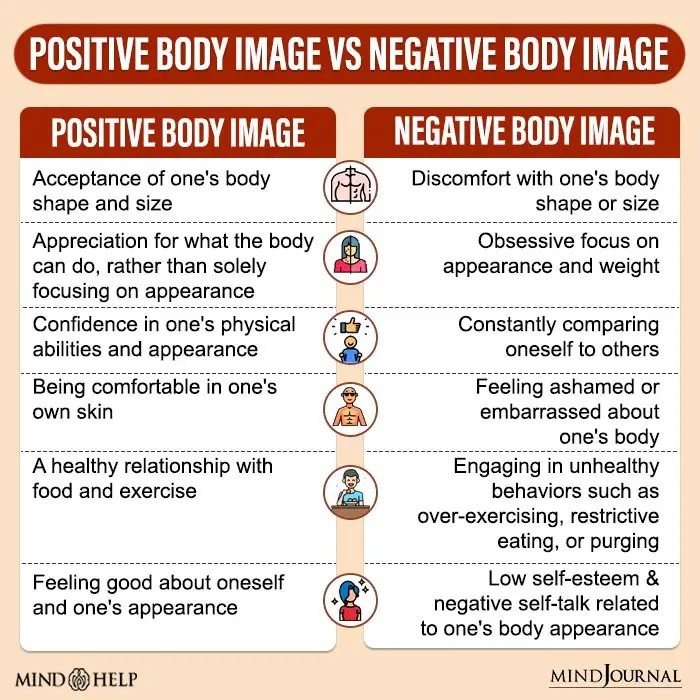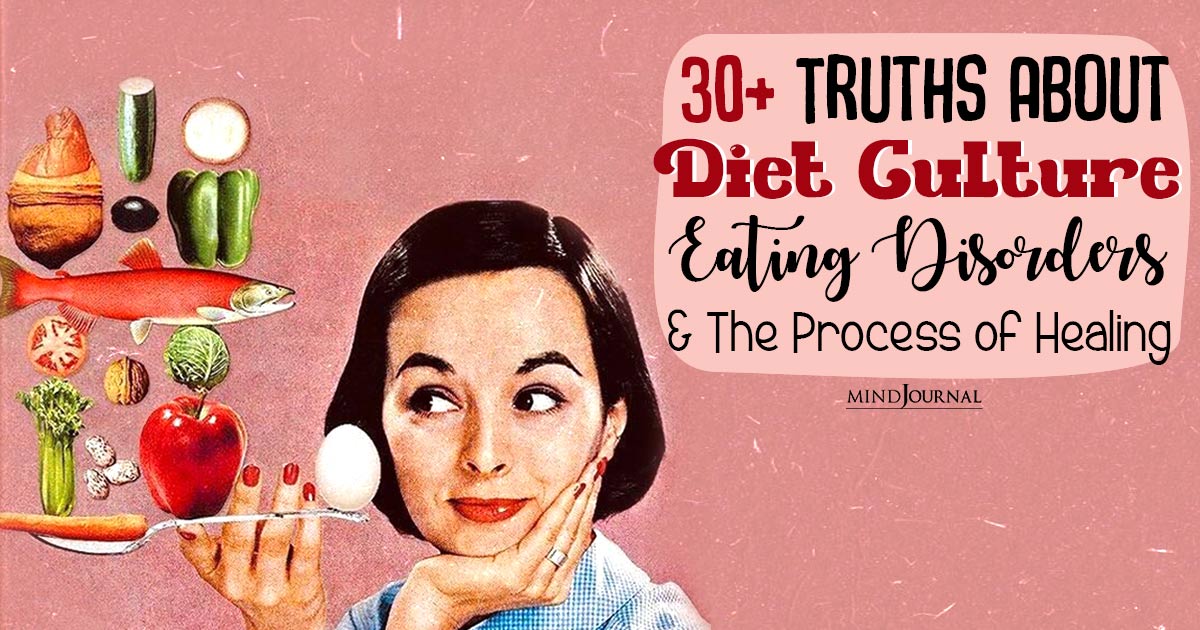Diet culture impacts so many people all over the world, and unfortunately, much of it’s impact is negative and harmful. If you are struggling with an eating disorder, then you’ve come to the right place. These truths about diet culture will help you understand it’s repercussions, and motivate you to live your life in a much healthier way.
If you are struggling with food or an eating disorder, these helpful points may offer you the nudge you need to change your relationship with food.
Related: Diving into Diet Culture Definition: 5 Startling Truths and Myths That Will Leave You Speechless!
30+ Truths About Diet Culture, Eating Disorders And Healing
1. Many people with eating disorders look healthy.
2. The good news is that the science of epigenetics tells us that having an eating disorder is not inevitable based on your genes alone.
3. Regardless of weight, positive body image predicts better health outcomes and protects against disordered eating.
4. Eating disorders in boys and men continue to be under-recognized, even though they experience higher mortality rates.

5. 1 death every 52 minutes—that’s the average rate of mortality from eating disorders.
6. At least 9% of the U.S. population (or 28 million people) will have an eating disorder in their lifetime.
7. Binge eating disorder is the most common eating disorder by far.
8. Not having access to enough food can increase vulnerability to binge eating.
9. Historical, systemic, and individual trauma may negatively impact physical health, mental health, and eating habits.
10. Rigid eating can negatively impact the gut-brain connection.
11. Body dissatisfaction and a diet mentality are significant factors in maintaining eating disorders.
12. Body mass index (BMI) was developed by a mathematician based on his concept of “the average man.” It was not created to consider differences across ethnic groups, race, gender, age, fitness levels, or the proportions of bone, muscle, and fat in the body.
13. Children, teenagers, and adults with eating disorders should be respected; they are not their illnesses. They have an illness. No one chooses to have an eating disorder, even if it started by a decision to diet and they are resistant to change.
14. Diet culture often interferes with the timely diagnosis and treatment of eating disorders.
15. Backwards (or no) weight checks may reduce the focus on weight, make weight more neutral, and place more attention on the healthy habits that promote recovery from an eating disorder.
Related: Beyond The Scale: Exploring Yo-Yo Dieting Meaning, Dangers And How To Stop
16. There are serious medical risks associated with all categories of eating disorders; eating disorders are potentially life-threatening illnesses.
17. Denying the seriousness of an eating disorder is a barrier to seeking help.
18. Recovery starts with calming your internal alarm system. That is why one key to recovery is eating the amount of food your body requires with enough structure, responsiveness, and predictability that your body, mind, and spirit are not operating from a place of scarcity or fear.
19. Unyielding self-criticism can contribute to dieting, emotional eating, or binge eating, and compassionate self-talk is associated with intuitive eating.
20. Families are not to be blamed when a child is diagnosed with an eating disorder. In fact, family members can be the greatest ally in a child’s recovery.
21. Weight and health are not always correlated. If your health requires attention, focus on specifics such as reducing blood pressure, stress, or cholesterol, or increasing activity level, interpersonal connections, and sleep.
22. Many studies on happiness reveal that supportive relationships are key to holistic health. If you want to improve your relationship with food, fostering meaningful connections to people can help.
23. Believing that no one understands is a common barrier to seeking help for an eating disorder. However, healing from an eating disorder is difficult if you are experiencing feelings of isolation.

24. When nourishing yourself is no longer rooted in fear, you can begin to find freedom with food.
25. All foods can fit into a healthy lifestyle.
26. Bringing neutrality to foods—that is, ditching labels such as “good” and “bad”—can place your attention on developing a greater awareness of your preferences and needs.
Related: 8 Questions To Ask Before Going On A Diet
27. Disordered eating behaviors can be an attempt to find self-definition, meaning, or purpose. Instead of habitually restricting food or reaching for it, ask yourself, Who am I? Where do I really want to go in my life? What now?
28. Following strict eating and exercise rules, and anxiously body checking, will make it nearly impossible to move into a healthier phase of health and living.
29. With repeated exposure to a feared food, your mind and body usually stop responding to it as if it were a threat.
30. The need to adapt to big life events, even positive changes, can trigger a desire to exert control, react, avoid, or escape. Instead of relying on food or the denial of it to manage vulnerable times, it can be helpful to slow down, be attentive, make a responsive plan, act toward yourself with kindness, ask for support, and tolerate uncertainty.
31. Obsessively tracking macros, pacing, and counting crunches while ignoring preferences, hunger, or fatigue will impede recovery. Listen to your body’s signals about hunger and fatigue instead.
32. Making your eating regular is the beginning of recovery from an eating disorder. The rest of the journey comes from values, inspiration, relationships, new habits, and more.
33. According to the nutrition standards for treating people with eating disorders, dietitians are encouraged to share the evidence of poor outcomes for intensive weight loss interventions when individuals are referred by health providers for weight loss.
34. Self-deception may interfere with recovery.
Related: Beyond Beauty Standards: 9 Ways To Improve Body Image
35. Adverse childhood experiences may play a role in relying on easy-to-access food.
36. Every person’s recovery from an eating disorder is personal and unique.
Yes, I want to learn more about Intentional Living.
Written By Gia Marson Originally Appeared On Dr. Gia Marson










Leave a Reply